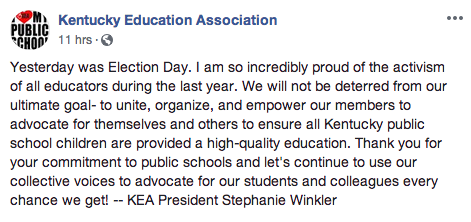Story by Elizabeth Erwin, News Editor, and Ciara Benham, Contributing writer
Eight months after the controversial pension bill was passed in Frankfort, educators repeatedly promised to “Remember in November!” But did they?
On Nov. 6, at least 36 current or former teachers were on the ballot for the Kentucky General Assembly.
The rise in educators running for office came in response to the controversial pension bill, Senate Bill 151. The passing of SB 151 resulted in several teacher walkouts across the state in April.
Opponents of the bill argued that it violated the inviolable contract whereby state workers are guaranteed the benefits that they were promised when hired. In late April, Attorney General Andy Beshear filed a lawsuit against the bill.
Since then, the bill has been stuck in a legal back-and-forth battle. Now, the bill awaits a final decision by the Kentucky Supreme Court.
In the 2018 midterm election, at least 36 current or former teachers were on the Kentucky ballot, hoping to make a difference when it came to pension reform. However, as the polls closed the majority of the candidates lost with only nine winners emerging.
Joe Baust, former Murray State professor and director for the center of environmental education, spoke about his views on teacher pensions and how they affect current and future educators.
“Beginning teachers now are going to have to do a 401K which is not like the kind of pension that other teachers have,” Baust said. “The problem with that is if you’re going to be a teacher, why would you come to Kentucky to teach?”
The pension problem extends beyond a teachers’ first years of work. Due to the inviolable contract, state workers are also ineligible for social security benefits.
Gina Crider, a public school teacher, voiced her concerns about the continuous pension and social security crisis facing teachers. Crider used to work in the private sector and willingly took a pay cut to pursue public teaching.
“I think the social security issue is the main point and it keeps going unreported,” Crider said, “I’m going to keep saying this until somebody listens, there are federal laws in place that keep any teachers, from getting our spouses social security.”
Crider earned social security from her 15 years working in the private sector, but it is no longer available to her because she became a teacher.
“If you untangle this pension system and make that into a 401K, you still have these federal laws in place that are punishing a group of people,” Crider said. “Can you think of a job where when you sign your contract you are actually giving up benefits? That’s essentially what teachers in Kentucky are doing.”
The Kentucky Supreme Court began hearings on the pension bill on Sept. 20. It was widely anticipated that a final ruling would be made by the end of October; however, the decision was pushed back.
Current educators aren’t the only ones voicing their concerns about the pension problem. Some students enrolled in one of Murray State’s largest majors, education, have their own fears about pursuing teaching careers in Kentucky.
Katie Warkentine, freshman elementary education major, is one of those students.
“As someone who is pursuing a degree, it is definitely discouraging seeing everything that has happened with the pension plan in Kentucky and how our government has chosen to respond,” Warkentine said.
She said the state of the pension bill is a threat to the future numbers of Kentucky teachers.
“I know it has pushed several educators out of the state that I’ve known personally and if something doesn’t change, it will only continue,” Warkentine said.
Freshman Nick Fuson said he plans to continue as a music education major despite the uncertainty of the state pension system.
“Entering into an already low-paying field that is now under threat of further economic damage is nothing less than terrifying,” Fuson said. “I will still pursue this position because of my love for teaching, but things are scarier now than they have ever been.”





























































































